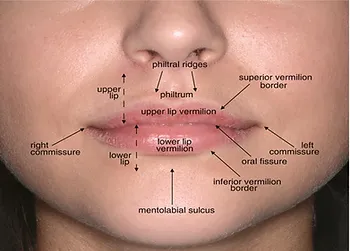










In normal-volume lips, we propose enhancing volume by injecting into the vermillion. In thin lips, we prefer to address first the ratio by injecting into the thinner lip, then the volume by injecting into the vermillion, and lastly the shape by injecting into the vermillion border when necessary.
When a facial cosmetic surgeon or other highly-trained injector looks at your lips, they don’t just notice if your lips are big or small, plump or thin: they observe the lips’ detailed underlying anatomy as well as your lips’ muscular movements, and how they interact with your surrounding tissues.
Several conditions may lead to the loss of lip volume or the presence of some mentolabial folds and perioral rhytides. These may be due to aging, sun damage, smoking, or hereditary factors. In some cases, there are people who also suffer from cosmetic asymmetries and genetically thin lips.

The lips consist of three separate tissue zones, which are the white lip, the vermillion (red lip), and the vermillion border. In cross-section, the lips are made up of skin, subcutaneous fat, submucosal fat, circumferential muscle orbicularis, and oral mucosa. Specialized dry mucosa makes up the free end of the lips.
The facial artery supplies blood to the lip via the labial arteries (upper and lower), with a variance in the anatomy and depth of these labial arteries. The primary artery lies intramuscularly and becomes more superficial, enabling it to supply overlying tissues.
A histological difference in the tissue zones may cause them to display different changes due to aging. This will show around the lip area as physical aging signs. Therefore, it is crucial to treat these tissues individually during the lip rejuvenation process.
In the classic lip augmentation technique, your injector places filler through the red/vermilion lip area to create an overall augmented appearance.
Unless they are correcting asymmetries, expert injectors aim to maintain your natural lip shape—your cupid’s bow and your lips’ unique dips and curves—while creating a uniformly augmented appearance.
This requires precisely moving the needle or cannula to evenly deposit the filler product. Expert injectors aim to maintain your natural lip shape while creating a uniformly augmented appearance.
For a typical lip augmentation with filler, your injector will aim for the vertical proportions of your upper lip to be about one-third less than the lower lip.
To restore dermal integrity we select a filler suitable for superficial placement
To enhance the vermillion border place linear threads intradermally along the vermillion border including the Cupid’s Bow area using a 30G 12mm needle
At this point, due to the superficial position of the needle, there no need to aspirate prior to each injection.
The grey shadow of the needle can be seen through the dermis when injection and a temporary tissue blanching of the immediate vermillion border occurs.
Anterior plumping of the lip requires placement between the vermillion border and the wet dry border. Increasing the vertical height of the lip is achieved by placing filler at the wet dry border and eversion can be achieved by placing the filler in the wet border in relation to the
Filler is placed in two or three threads (0.05-0.1m per thread depending on the volumisation required), the length of the lip quadrant before applying gentle pressure with finger and thumb to mould the product into one cohesive sheet.
These are caused initially by dynamic muscle movement either from smoking or simply communication, together with age-related loss of dermal integrity.
As the ageing process continues subcutaneous fat atrophy may also be a contributing factor. However, the problem is primarily dermal, and restoring dermal integrity will yield the most natural result. For best results a soft / fine filler is injected extremely superficially directly into the wrinkles using a 30G 12mm needle for a smoothing effect. Very small amounts (o.1-0.2ml) are required for most treatments.
While dermal fillers are casually known as “wrinkle fillers,” they can do much more than just smooth out wrinkles, although they are excellent at this too! Here are a few of the common issues dermal fillers can help address:
Smooth out lines around nose and mouth (a.k.a. marionette lines, smile lines, and parentheses)
Enhance & restore volume to sunken cheeks or temples
Diminish vertical lip lines
Plump & enhance the lips
Smooth out a chin crease
Improve symmetry among facial features
The best lip augmentation procedure is different for every person. The right procedure for you depends on your goals and lip shape and size. For example, lip implants or a lip lift may be ideal if you prefer permanent results.
However, implants may not be appropriate for razor-thin or asymmetrical lips. Together with your healthcare provider, you can determine the best approach for you.
Every doctor has their own rules, but the heavy-hitting no-no's across the board in the week leading up to a lip filler appointment, and most crucially, 48 hours prior, include smoking, drinking alcohol, taking blood thinners, and using dietary supplements, like St. John's Wort, vitamin E, and fish oil, because they soften the blood, which can lead to a higher chance of bruising and swelling.